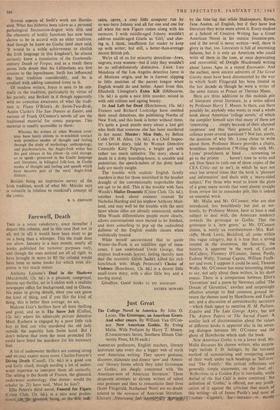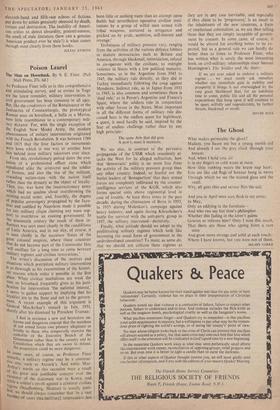Just Great
The College Novel in America. By John 0. Lyons. The Grotesque, an American Genre. And other essays. By William Van O'Con- nor. New American Gothic. By Irving Malin. With Prefaces by Harry T. Moore. (Crosscurrents Series, Southern Illinois Uni- versity Press, $4.50 each.) AMERICAN professors, English teachers, literary Malin discusses his chosen writers, who surpris- historians spin every day a bigger web of myth ingly include J. D. Salinger, by the too-easy over American writing. They spawn geniuses, method of summarising and comparing some discover, elaborate and dissect 'new' and 'Ameri- of their work under such headings as 'Self-love' can' literary forms which they label Grotesque and 'The Family.' His critical reflections are or Gothic, are deeply concerned with 'the generally simple statements, on the level of American-ness of American literature.' These 'Reflections in a Golden Eye is inevitable, while desperate attempts to elevate writers of talent Ballad of the Sad Café is more contrived: No into geniuses and then to romanticise their lives definition of 'Gothic' is offered, nor any justifi-
(Scott Fitzgerald, Nathanael West) are no doubt cation of it against the criticism that much of
related to the newness of American literature. this writing—all of James Purdy's and most of Literary Americans feel ernotippalty• al re +:`Truman Capote's; for I instance - -is merely cates, opera, a cosy little company run by by the time-lag that made Shakespeare, Byron, ex-war-hero Johnny and all for one and one for Jane Austen, all English, but if they have less all when the new Figaro comes along with his literature they write more about it. Every student menaces. I wish middle-aged Johnny wouldn't at a School of Creative Writing has a Great ,address middle-aged Gisela as 'Girl,' and clue- American Novel in his outsize fountain-pen, ing is, I think, insufficient for reader to keep and if the novel is never written—well, there is up with writer; but still, a better-than-average glory in that, too. Literature is full of interesting decent British job. failures, but it is only an American who could We're all of us for minority detectives—Jews, write of them in the tone, at once deprecating negroes, even women—but if only they wouldn't and reyerential, of Dwight Macdonald writing
be so self-defensively distinctive. Lieut. Luis about James Agee in a recent Encounter. And Mendoza of the Los Angeles detective force is the earliest, most sincere admirers of The Great of Mexican origin, and he is forever slipping Gatsby must have been disconcerted by the way
in little snatches of the parent tongue when in which Scott Fitzgerald has been treated in English would do and better. Apart from this, the last decade as though he were a writer of 13s. 6d.) is quite a nice little murder, mixed in Here are three additions to this moleish pile with odd cultism and ageing beauty. of literature about literature, in a series edited In And Left for Dead (Hutchinson, 13s. 6d.) by Professor Harry T. Moore. Is there, can there Frances and Richard Lockridge have omitted possibly be, anybody who wants to read a whole their usual detectives, the publishing Norths of book about American 'college novels,' of which New York, and this book is better without them. the compiler himself says that many of them are It's quite a good puzzle story about a lost girl 'interesting . . . simply because of their abysmal who finds that someone else has been murdered ineptness' and that 'their general lack of ex- in her name. Murder : Men Only, by Belton cellence poses several questions'? Not last, surely, Cobb (W. H. Allen, 13s. 6d.), is a Chief Inspec- the question of why Mr. Lyons chose to write for Cheviot story, told by Woman Detective about them. Professor Moore provides a chatty, Constable Kitty Palgrave, a bright girl with breathless introduction (`Writing this with Mr.
rather too much initiative. The story, about a Lyons' proofsheets at hand . . . screaming to death in a dotty boarding-house, is amiable and go to the printer . . . haven't time to write and pedestrian; the speech-habits of the dotty land- ask Don Sears to rush one of those copies of the lady are nicely caught. CEA Critic out to me'), in which he says not The trouble with realistic English family once but several times that the book is 'pleasant murders is that for those nourished in the headier and informative' and deals with a 'many-sided draught of the conventionally improbable they subject.' For those who want to know the plots are apt to be dull. This is the trouble with Sara of a great many novels that went almost straight Woods's Malice Domestic (Crime Club, 12s. 6d.), from review list to remainder pile, this is indeed Nicholas Harding and his nephew Anthony Mait- Mr. Malin and Mr. O'Connor, who are also While myself unconvinced that to quote this vague category, but it is true that a strong Goodbye. Good books to my successor. `Gerontion' and a poem by Newman called 'The Dream of Gerontius,' another and surprisingly effective attempt to find common ground be- tween the themes used by Hawthorne and Faulk- ner, and a discussion of untrustworthy narrators —which finds space to mention II. M. Fulham, Esquire and The Late George A pley, but not The Aspern Papers or The Sacred Fount. A similar lack of discrimination about the values of different books is apparent also in the amus- ing dialogue between Mr. O'Connor and the ghost of Hawthorne which ends the book.
New American Gothic is on a lower level. Mr. eleventh-hand and fifth-rate echoes of fictions put down by artists genuinely obsessed by death, torture and destruction. The inability of Ameri- can critics to detect absurdity, pretentiousness, the smell of stale literature (how can a genuine American product ever be stale?) is what comes through most clearly from these books.
JULIAN SYMONS



































 Previous page
Previous page